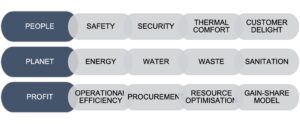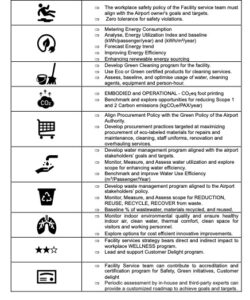Airlines and airports globally have wholeheartedly embraced a mission for carbon neutrality and sustainability in every aspect of their airside and landside operations. Local environmental, cultural, and political boundaries have firmly set the framework for sustainability programs. The Facility Management team, responsible for the logistics and upkeep of airport infrastructure, possesses an exceptional opportunity to lead the transformative journey towards sustainability. The facility services within its scope can undoubtedly bring about a positive transformative effect on the PLANET (environment), PEOPLE (service people, customers) and PROFIT (economic) sustainability.
International Civil Aviation Organization (ICAO):
“The three pillars of sustainable development are especially relevant to the aviation sector that, by offering a safe and efficient means of mass transportation, is universally recognised as an essential component of the global economy and universal social progress.”
- Globally, there are currently 576 accredited airports at Level 1 Mapping, Level 2 Reduction, Level 3 Optimisation, Level 3+ Neutrality, Level 4 Transformation, Level 4+ Transition and Level 5.
- 85 Airports in the Asia-Pacific and Middle East have achieved accreditation through the Airport Carbon Accreditation program at Level 1 Mapping, Level 2 Reduction, Level 3 Optimisation, Level 3+ Neutrality, Level 4 Transformation, and Level 4+
- In India, there are currently 30 accredited airports at Level 2 Reduction and Level and Level 4+
Here are a few Key facts about Indian Aviation Industry –
- India’s aviation sector has witnessed significant expansion, with 545 routes operationalised under the Ude Desh ka Aam Nagrik (UDAN), aimed at improving air connectivity to underserved regions.
- Alongside route expansion, 21 Greenfield Airports have been identified for development in the country, out of which 12 have been operationalised, reflecting the government’s commitment to enhancing air travel infrastructure.
- With 158 operational Airports and the construction of 84 airports over the last decade, India’s aviation network is rapidly evolving.
- Over 770,483 aviation movements occurred in the April to June 2024 quarter, representing an 8.1% increase compared to the same quarter in 2023. (source: Airport Authority India)
- Over 99.539 million people travelled by air from April to June 2024, representing a 7.1% increase compared to the same quarter in 2023.
- The recorded air freight was 906,397.4 tonnes in the April to June 2024 quarter, an approximately 14% increase compared to the same quarter in 2023.
Read more at https://www.aai.aero/en/business-opportunities/aai-traffic-news
Initiatives and facilitation of the Sustainability Program by Airport Facility Services
The Facility Service team effectively manages and controls the critical pillars of environmental sustainability, including energy, water, and waste management. People-centric policies and governance models significantly impact the workplace experience for in-house and outsourced service team members, as well as the experience of customers. Additionally, the carefully chosen application of technology, risk management program, and lean management strategy, with a laser focus on stakeholders’ interests, are poised to yield profitability.
The Airport Authority of India (AAI) has implemented a policy to transform into a greener, cleaner, and healthier environment in line with India-specific sustainability program contributing to Nationally Determined Contributions (NDC) targets. AAI targets to reduce Scope I and II emissions by 5% per passenger per year and to reduce direct emissions by 75% by 2030 (over the 2015 baseline) at its airports. The transformative roadmap towards carbon neutrality and net-zero emissions outlines key operational performance and quality indicators for the Facility Service team to collaborate, coordinate, and make substantial contributions.
Key Drivers for Facility Management Service Business
![]()
Typical service portfolios managed by in-house or outsourced Facility Management team

Sustainability initiatives and support services

The evolution of service levels in facility management reflects the changing demands of end users, with Gen Zers placing more emphasis on environmental protection. The Facility Service team must prioritize the development of sustainable service frameworks to meet these needs and actively seek opportunities to improve and protect the environment, thereby contributing to wider sustainability efforts.

